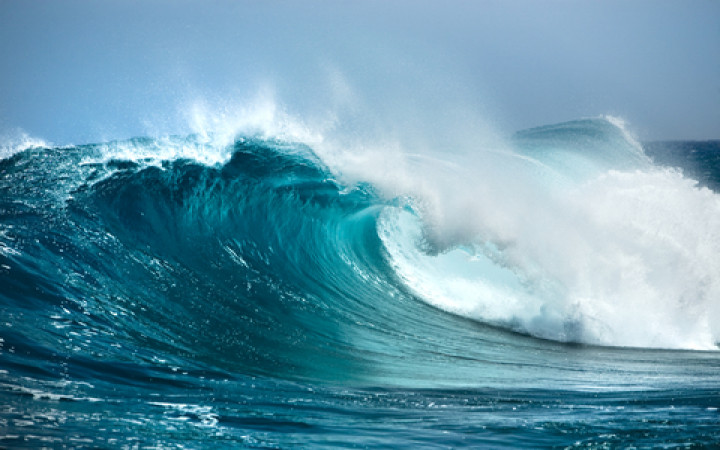Today’s Wonder of the Day was inspired by brogan. brogan Wonders, “How is ocean water salty?” Thanks for WONDERing with us, brogan!
Water, water, every where, / Nor any drop to drink
In these lines from a well-known poem— “The Rime of the Ancient Mariner” by Samuel Taylor Coleridge—an “ancient mariner,” or sailor, complains of being surrounded by water he cannot drink. He is on a ship in the ocean, suffering from thirst. Why would someone be thirsty when there is water all around? You guessed it! Because ocean water is too salty to drink. We know that sea water is salty—but do you know why? Let’s WONDER together!
Our planet is made of about 70% water, and 97% of that water is salty. All the oceans—from the Atlantic to the Pacific, from the Arctic to the Indian—are all salty! What is in ocean water, anyway? It is mostly made up of water, of course. But there are lots of other elements in the water, too. There are dissolved salts and minerals in ocean water. There are small amounts of many chemicals—even metals like gold!
Some of these elements enter the ocean through runoff. But what is runoff? Runoff is water that flows over the land and into streams and rivers. When it rains, some water absorbs into the soil. When the soil can’t take in any more moisture, the rainwater turns into runoff. Rainwater is mildly acidic. Just as acidic foods like orange juice or soft drinks can slowly eat away the enamel of your teeth, acidic rainwater eats away at rocks and soil. Tiny bits of the rock and soil join with the rainwater as runoff. Runoff then flows into streams and rivers. Eventually, rivers flow into oceans. In that way, minerals and salts from runoff make their way to the ocean.
Two of the most common elements to end up in the ocean due to runoff are sodium and chloride. When sodium and chloride combine, they form sodium chloride. In other words, salt! But runoff isn’t the only reason that ocean water is salty. Salt also comes from the depths of the ocean.
Deep down on the ocean floor, there are hydrothermal vents. Hydro means water, and thermal means heat. Not surprisingly, these are vents that push hot water into the ocean. Where does this hot water come from? Great question! First, ocean water leaks into the oceanic crust, or “floor” of the ocean. It is heated by magma from the earth’s core. Then, this heated water gets pushed out of the hydrothermal vents.
The warm water from the vents contains a lot of dissolved minerals. These include—you guessed it!—more salt. A similar reaction happens when underwater volcanoes erupt. The seawater surrounding the volcano reacts with the hot rocks of the volcano. Minerals and salts from those rocks dissolve into the ocean water.
So now we know why ocean water is salty. But if part of the salt in the ocean comes from runoff from the land, why aren’t lakes and rivers salty? The answer is that they are! Most lakes and rivers are freshwater, which means they are not salty. But that doesn’t mean they contain no salt. They have some salt, but less than the ocean. Lakes and rivers are replenished by rain, so they do not get too salty. Oceans, though, get their salt constantly replenished as rivers emptying into them.
There are some lakes that are very salty, though. You may have heard of the Great Salt Lake or the Dead Sea. These salty lakes tend to be very large, and they form inland (not connected to the ocean). The largest of these salt lakes is the Caspian Sea. Australia has thousands of salt lakes! Not only are these lakes salty, but they are even saltier than the ocean!
How could that be? Well, these lakes tend to fill up with runoff and groundwater, both of which are full of salts and minerals. They may tend to be less salty during times where there is a lot of rainfall, then grow saltier as water evaporates and the lake dries up. Some of these lakes dry up completely during certain times of the year. They can be ten times saltier than the ocean!
Not many animals can live in a place that is so salty. And, of course, salt water is not healthy for people. You know from the poem at the beginning of this Wonder that we can’t drink ocean water because it is too salty. In fact, if we tried to drink salt water, it would make us sick. Too much salt can be dangerous for our bodies. And because so much salt would make someone urinate more to get rid of it, drinking sea water actually makes us thirstier and more dehydrated.
You may be WONDERing, is there any way to take the salt out of water so we could drink it? If so, you’re not the only one! As droughts become more common and more severe, many hope that we could one day get more of our drinking water from the ocean. There is a way to remove salt from seawater. It is called desalination. However, it is not an easy process. Salt dissolves in water so easily that it is hard work to separate them. Desalination takes a lot of energy. Because of that, it is very expensive. Using so much energy has environmental costs, as well.
There’s so much to learn about salt water! What are you curious about?
Standards: CCRA.R.1, CCRA.R.2, CCRA.R.8, CCRA.R.10, CCRA.L.3, CCRA.L.4, CCRA.L.5, CCRA.L.6, CCRA.W.2, CCRA.W.4, CCRA.W.7, CCRA.SL.5 NGSS.ESS2.C, NCAS.CR.1, NCAS.CR.2




